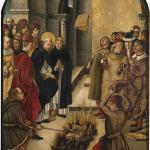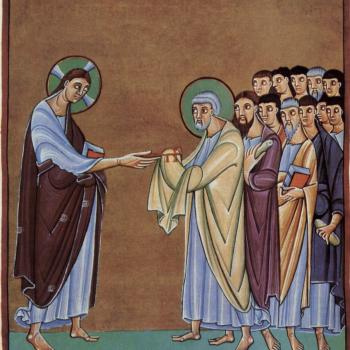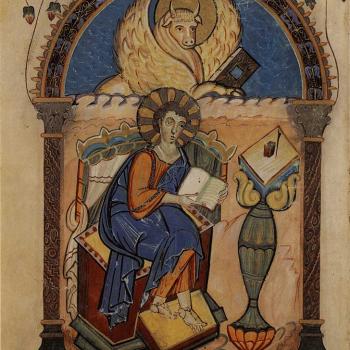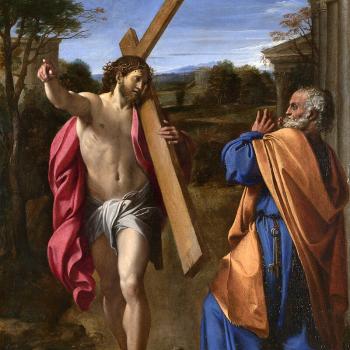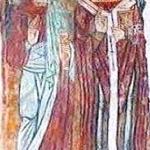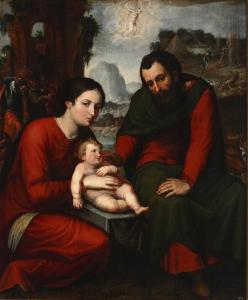
As I was scrolling through my Facebook feed the other day, a post about the Marian dogmas with a link to a debate caught my eye. Although it has been some time since I have listened to a theological debate, for whatever reason I clicked on that link, put on my headphones, and started doing some things I needed to get done around the house that day. I am glad I did.
The debate was on the topic of the Perpetual Virginity of Mary, with an Evangelical named Kelly Powers arguing against the doctrine, and William Albrecht of Patristic Pillars defending it. Albrecht is a seasoned debater, and he has been involved in Catholic apologetics at least since I converted over 13 years ago. He has also collaborated with Fr. Christiaan Kaapes on a few books.
Powers is associated with Berean Perspective Apologetics, and his bio states that he has “been involved in Christian Apologetics since the early 1990’s, served in churches as elder, lay pastor, evangelism and outreach ministries, children, youth, and young adult ministry, men’s ministry leader and more.”
The debate can be found on the YouTube channel of that organization, as well as on the Patristic Pillars channel where I streamed it from. As this post is not a full analysis, or a blow by blow narrative of the whole event (which streamed online three days ago), I recommend that folks check it out. In it, Powers concedes that the writings of the Early Church Fathers are not his wheelhouse (23 min.), and I can respect that admission. Similarly, I will say at the outset that I do not consider the Marian dogmas in general (i.e. whether in Scripture or in the Fathers) to be my forte. I will also add that I have the benefit of going in after the debate and adding my thoughts, one which was not available to the debaters as they were live.
Some Narrative/Analysis:
Albrecht gives a strong opening statement. As he noted, he gives a positive presentation of the doctrine, laying a Scriptural foundation. In Catholic fashion, the Early Church Fathers are occasionally utilized as a lens through which to view the Scriptures. His argumentation is noteworthy in that he argues for the perpetual of Mary from Sacred Scripture. This is in contrast to arguing for the authority of the Church on the basis of Scripture, and then trying to prove the perpetual virginity of Mary from that particular angle.[1]
For his part, Powers lays out in his opening statement what (with the benefit of hindsight) will also be his lines of questioning in his first cross-examination of Albrecht. Formulated as statements, we might say that Powers argues that the perpetual virginity of Mary was not taught by Jesus (in the Gospels), by the Apostles (in the rest on the New Testament), and he sees very little explicit evidence for it in the Fathers of the first three centuries. He objects to what he sees as a later invention that is not present in the Ante-Nicene Fathers. Finally, he raises objections to the doctrine on the basis of his understanding of various NT texts. From memory, these are largely semantic.
Moving on to Albrecht’s first cross-examination (30 min.), the questioning centers around previous comments Powers made wherein he claimed that both Sts. Irenaeus (d. ca. AD 202) and Hegesippus (d. ca. AD 180) denied the perpetual virginity of Mary. With respect to Irenaeus, Powers’ argument centers around his Against Heresies 3:21:4, specifically where the Saint references Mt. 1:18, 23, and his use of the phrase “that before Joseph had come together with Mary”. Powers argues that this language (“come together”) refers to a physical (i.e. sexual) union between them.
Albrecht rebuts that it refers rather to a union of households, and offers Jeremiah 3 [from the Septuagint?] as semantic evidence. When pressed, Powers concedes that he is unable to offer similar semantic evidence to strengthen the physical union interpretation. As such, Albrecht and Powers shift their attention to St. Hegesippus (ca. 39 min.)
Here, a fragment of Hegesippus preserved in Eusebius of Caesarea’s (d. AD 339) Ecclesiastical History (3:19-20) is discussed. Powers focuses on the phrase “according to the flesh” used by Hegesippus, arguing that it is evidence that the author rejects the perpetual virginity of Mary. Once again, Greek semantics come into play, and to my understanding Albrecht has another edge here in so far as command of the Greek language is concerned (Powers and I seem to be in a similar boat here as well). Thus, Albrecht points his opponent to the same book of the same work (i.e. Eusebius’ Ecclesiastical History, Book III), specifically Chapter 11:1 [did he mean to add 11:2?] to bolster his argument.
It is in this exchange where Powers demonstrates some unfamiliarity with his source(s) (Eusebius/ Hegesippus, and Eusebius) in that he seems unaware of the fact that, as William points out, he is citing a fragment of Hegesippus preserved in Eusebius. Moreover, he was uninformed of the text that Albrecht cited from the same source just chapters earlier (they aren’t very long chapters). That being said, and to his credit, he jotted down the reference for the future and took the criticism on the chin.
Based on the evidence presented, I would have to agree with Albrecht’s assessment that this pair of supposed deniers of the perpetual virginity do no such thing in the texts presented. If we consult the late Anglican Patristics scholar J.N.D. Kelly’s well known work Early Christian Doctrines, neither Hegesippus nor Irenaeus are cited as opponents of the doctrine in his survey of the Ante-Nicene Fathers. There, the only author cited as affirming that Joseph had conjugal relations with Mary is Tertullian (pp. 491-494, cf. n. 5 p. 493). We find the same claim in Dr. Ludwig Ott’s Fundamentals of Catholic Dogma (p. 206). This is one apparent witness that Powers was not able to enter into the record this time around. Others, like Helvidius [mentioned by Albrecht ca. 46 min.], Eunomius and Jovinian would not seemingly jive with Powers’ methodology (discussed below), as for him they come too late (Ott, p. 206). The last three were notable heretics, and Tertullian too, for he ultimately succumbed to Montanism centuries before. As such they are not excellent witnesses.
As I have gotten lengthier and more narrative driven than I had envisioned, I will remind readers that the topics/ lines of inquiry which Powers lays out in his opening statement, reappear in his cross-examination of Albrecht. His first question was to determine whether or not William saw this as a matter of salvation, to which he replied that he did (more on this below too). His next questions are tailored towards demonstrating his belief that the perpetual virginity of Mary is not found in the NT (Jesus or the Apostles). Moreover, he argues that little support is found in the Early Church Fathers. To all of this, William of course objects, bringing forth his own evidence from Scripture, as well as from Early Church Fathers from the Ante-Nicene period and beyond.
2 Items That Caught My Attention:
1. There seems to be this tendency among some Evangelicals to make everything a matter of salvation. What I mean by this, there is an apparent propensity to want to ask “does one need to believe this to be saved?” This comes up both in Powers’ opening remarks and in his cross-examination. Albrecht answers in the affirmative, probably because, as he notes, Christology and Mariology are so interconnected. I might add that the essential/ non-essential (read salvific/ not-salvific) concept is arguably foreign to Catholics, who are not at liberty to reject dogmas. It may have been Dr. David Anders that I heard on the radio a few years back who pointed out the fact that there is no mechanism in Protestantism to distinguish between what is and what is not a dogma. This may be why they are the only group of Christians who seem to have such a concept?
2. One of my main criticisms in this debate is with Powers’ methodological approach, especially, the cut off point of the 4th century for what he will admit as acceptable evidence. I am not sure what the rationale for this is (Constantine?), but it is seemingly arbitrary. It is somewhat reminiscent of the approach that certain Anglicans took at the turn of the twentieth century, who limited their study of the papacy down to the Council of Chalcedon (AD 451).[2] Without knowing the rationale for not admitting evidence past an apparently arbitrary date (beginning of the 4th c.), it is hard to critique much further, except to say that it presents problems for Powers’ own positions. I suspect that the more that he dives into Church history, the more apparent this will become to him.
Take for example the 27 Book NT Canon that Catholics and Protestants both affirm. The first complete list we possess dates to the mid-fourth century, and is contained in St. Athanasius’ Epistle 39. What is more, there is ample evidence showing that certain of these Books (1 Peter, Hebrews, Revelation, etc.) were not accepted universally until the beginning of the 5th century. Yet when St. Athanasius was conceded by Powers as being a 4th c. witness to the perpetual virginity of Mary, he implied that he was too late and shrugged him off (58 min.) What external evidence might Powers use in a debate on the reliability of a 27 Book NT Canon? The clearer evidence does not come until after the time he has expressed being comfortable with.
Having said all of that, I enjoyed the debate, and I commend both William Albrecht and Kelly Powers for having the courage to publicly debate the issue, and for making it available. If you have any comments, or feel like I completely missed the mark somewhere, let me know below. Thanks for reading!
[1] Cf. the James White vs. Robert Sungenis debate on the Bodily Assumption of Mary on 9/10/2010. As the latter points out, the literary evidence is not particularly abundant on that topic.
[2] Cf. Adrian Fortescue, The Early Papacy to the Synod of Chalcedon (San Francisco: Ignatius Press, 2008), 20.


